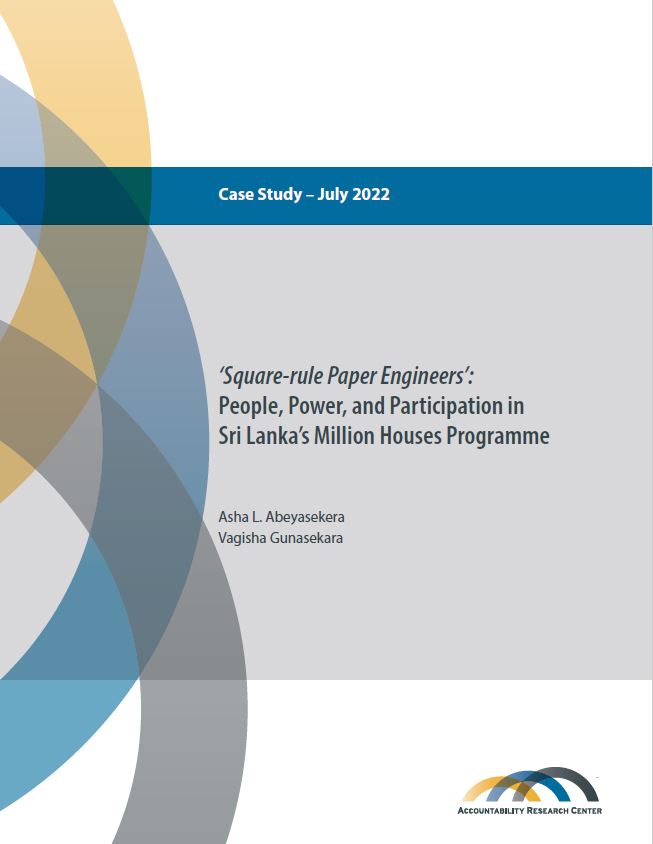
‘Square-Rule Paper Engineers’: People, Power, and Participation in Sri Lanka’s Million Houses Programme
Date: July 2022
Author(s): Asha L. Abeyasekera and Vagisha Gunasekeara
Publication type:
Published by: Accountability Research Center
“Sandwich strategies” are interactive processes in which reformers in government take tangible measures that reduce the risks of citizen action from below, driving virtuous circles of mutual empowerment between pro-accountability actors in state and society. This case study is one of a set of 18 published here, which are among those included in comparative analyses of whether and how sandwich strategy initiatives drive institutional change.
The Million Houses Programme, which aimed to construct a million houses between 1984 and 1989, was a radical and successful approach to providing homes for the rural and urban poor in Sri Lanka. It provided long-term leases for house plots with the promise of ownership, low interest start-up loans, and training for self-building and basic community infrastructure. This case study traces the background and political context of the programme, the politics and personalities behind it, how it was implemented, and the factors that contributed to its success.
The Million Houses Programme marked a shift from top-down, centrally-controlled policies for housing for the poor to a state-supported “people’s process” that recognised people’s potential for creativity. The provision of residency permits to low-income households represented a significant shift in poor people’s citizenship and right to housing.
The Million Houses Programme is the legacy of a Prime Minister committed to a philosophy of self-building and self-managing low-income housing, who appointed reformist bureaucrats and had the support of donors such as the World Bank and UNICEF. At the same time, the expansion and restructuring of existing community-based organizations was crucial to the implementation of the program. Pre-existing local councils participated in resource allocation decisions. The rural Village Awakening Committees included voluntary organizations and worked with government officials to choose the program participants and then monitor the building process. In urban areas, the program energized elected, more autonomous Community Development Councils, which systematized outreach, selected participants, enabled gender inclusion, and managed loans.
The 1994 change in government ended the program and central authorities crowded out the councils’ role. By 1999, of the 625 registered Community Development Councils, only 126 were functioning effectively and 100 were functioning irregularly.
Asha L. Abeyasekera is an International Fellow of Urban Studies at Royal Holloway, University of London. She served as a senior lecturer—Gender and Women’s Studies—at the Faculty of Graduate Studies, University of Colombo (2012–2021). She obtained her PhD in International Development and Social Anthropology from the University of Bath. Her research interests are women’s care work and the gendered labor of homemaking; ethical self-making; and cross-cultural expressions of emotions and wellbeing. She is the author of Making the Right Choice: Narratives of Marriage in Sri Lanka (2021, Rutgers).
Vagisha Gunasekara is a Sri Lankan political economist. She has conducted both quantitative and qualitative studies on a range of topics including poverty, labor relations, land settlement and use, service delivery, national and household debt, and geopolitics. In recent times, she led research on livelihoods in conflict-affected regions in the Secure Livelihoods Research Consortium, UK; served as a Visiting Lecturer—Gender and Women’s Studies—in the Faculty of Graduate Studies, University of Colombo; and taught development studies as a Senior Lecturer in the Department of Social Studies at the Open University of Sri Lanka. Vagisha received her PhD from Purdue University, Indiana, USA. She co-edited The Political Economy of Conflict and Violence Against Women – Cases from the South (2019 Zed Books) with Kumudini Samuel and Claire Slatter.
